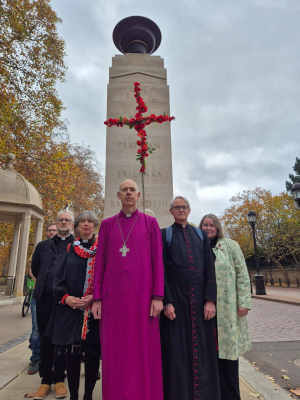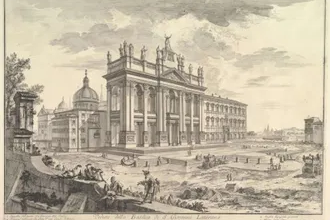Former Archbishop of Canterbury joins campaigners speaking out against rise of Christian nationalism

Clergy with red cross of poppies in front of Commonwealth Memorial Gates. Image: CFAWB
Source: Christians for a Welcoming Britain
On Friday 7 November, a group of UK Christians spoke out against the Christian nationalist narrative they say is the antithesis of the values at the heart of their faith. Those speaking out include a former Archbishop of Canterbury, bishops, clergy and lay people. Ahead of Remembrance Sunday, a prayer walk was held around London's Hyde Park, stopping at several sites which signify how people born in other countries have contributed to and enriched Britain.
One of the locations was the Commonwealth Memorial Gates, which commemorates the men and women from the Indian subcontinent, Africa, the Caribbean and other Commonwealth countries, who died in the second world war. Here, a large cross, of woven red poppies and roses was held up in front of one of the memorials at this site, in remembrance of those who sacrificed their lives.
The red cross made the shape of a St George's flag when held in front of the square, white memorial stone. This represented a sign of respect for how these soldiers have shaped the Britain we celebrate today.
Holly-Anna Petersen, an attendee of the prayer walk said: "The act of creating the St George's flag in this way was done to reclaim the flag as an inclusive symbol for Britain, and to ensure that, as a Christian emblem, it reflects the Christian principle of loving thy neighbour".
Former Archbishop of Canterbury, Rowan Williams, was not able to attend the prayer walk, but shared a statement speaking out against Christian nationalism: "It is more than time to challenge the story that every migrant approaching our shores is an unfriendly alien with unintelligible and hostile values. It is essential for us to see, not enemy invaders, but vulnerable people like us, committed to finding safety for themselves and those they love. It is the height of injustice to hold communities responsible for the crimes of individuals and to market lazy, hurtful stereotypes.
"Christian culture, about which we hear so much from some quarters, is based simply on the recognition that we share common human needs and that we are given strength and generosity in Christ's Spirit to serve those needs wherever they appear, and to welcome the gifts that strangers offer us - as so many do by their service to this society."
Some of the Christians involved in the prayer walk are part of a newly formed group called Christians for a Welcoming Britain, which organised the prayer walk. This is a voluntary, grassroots and growing group of UK Christians, highlighting that Christian values are those of welcome and loving our neighbour.
During the prayer walk, attendees also reflected on the impacts of growing inequality in the UK, with wealth increasing for the mega-rich, while others suffer a cost-of-living crisis.
Revd Helen Burnett, a vicar in the Southwark Diocese, said: "A small number of mega-rich people are amassing ever-increasing fortunes, which is draining the country, leaving everyday people struggling to make ends meet. It's immoral that we are seeing migrants used as scapegoats for this and being blamed for the lack of public funds resulting from years of deliberate austerity. Asylum seekers did not create this crisis; their plight has been manipulated to vilify them, when the fact is that they are struggling for a decent life like everyone else."
Rt Revd Canon Dr Anderson Jeremiah, Bishop of Edmonton, said: "Without Christ's unconditional love, the cross is merely an instrument of violence. By dying on the cross Jesus transformed the cross from a means of death into an ultimate symbol of love. To wield this symbol to hate or alienate people is to crucify Christ's message all over again."
Rt Revd Martin Gainsborough, Bishop of Kingston, said: "The God that I believe in leads me to celebrate the rich diversity of our nation, indeed of all creation. The Church imagines a variegated, interdependent body, where the suffering of one is the suffering of all. There is much more we need to do as a society to tackle inequality and a sense, for far too many, of being left behind. Meanwhile I am proud to stand with all those who believe in this generous, hospitable vision where all are welcome and where we commit to the flourishing of all."
Rt Revd Mary Gregory, Bishop of Reading, said: "Jesus spoke for the vulnerable and the marginalised, those at the edges of society. He was a voice for the poor, for those unable to speak for themselves. As Christians we are called to follow this example to welcome everyone with love, feed, clothe and help anyone who needs it.
"The cross is the symbol of this kind of welcoming, reconciling love. It stands for the embrace of the God of love to a world that is broken and hurting, bringing together what has been held apart. It cannot be, must not be, distorted into a symbol of exclusion and hate. On today's walk, the cross reclaims its rightful identity as a sign of love and of rescue."
The Venerable Jonathan Croucher, Archdeacon of Chelmsford said: "Uniting with people of goodwill we want to offer calm voices, care and wisdom in seeking to protect and sustain cohesion in our communities, in all their wonderful diversity, prayerfully speaking grace and peace into confrontations which too often have become violent and divisive".
Rt Revd Dr Rosemary Mallett, Bishop of Southwark said: "We are living in very trying times, and the cost-of-living crisis is not abating. Our poorest communities are experiencing severe social and economic challenges, with 4.5 million people living below the poverty line. Many individuals and families are finding things difficult to manage and feel their issues are being ignored. Yet all too often the media focus is on migration, while the root causes remain unaddressed.
"In today's increasingly polarised public debate on economy, identity and borders, listening and empathy are paramount. Listening to those who feel socially and economically disenfranchised and to those incomers fleeing from persecution and war. Migration is not simply a policy issue for the government but a test of our shared humanity. As Christians, our gospel calls us to love our neighbours, and to see the face of God in each other. We must reject any narrative that says the cross is a symbol of exclusion. The cross calls us to a life of love and sacrifice."


















